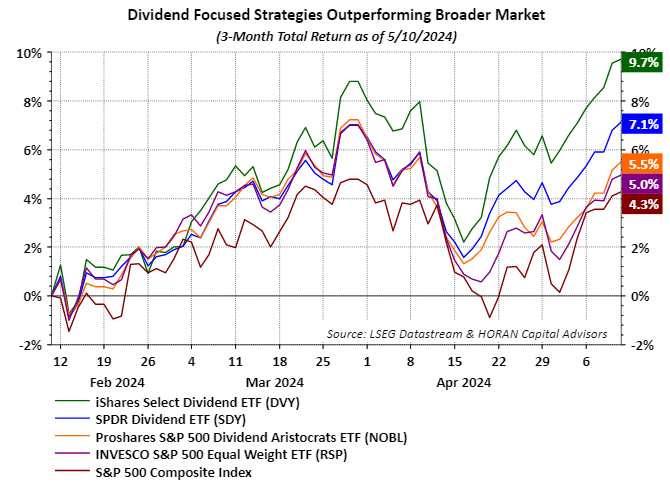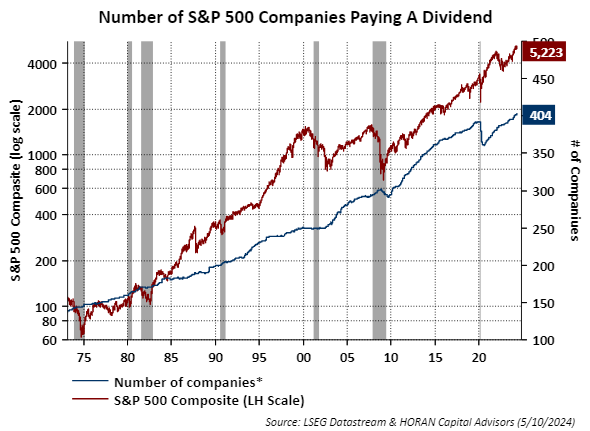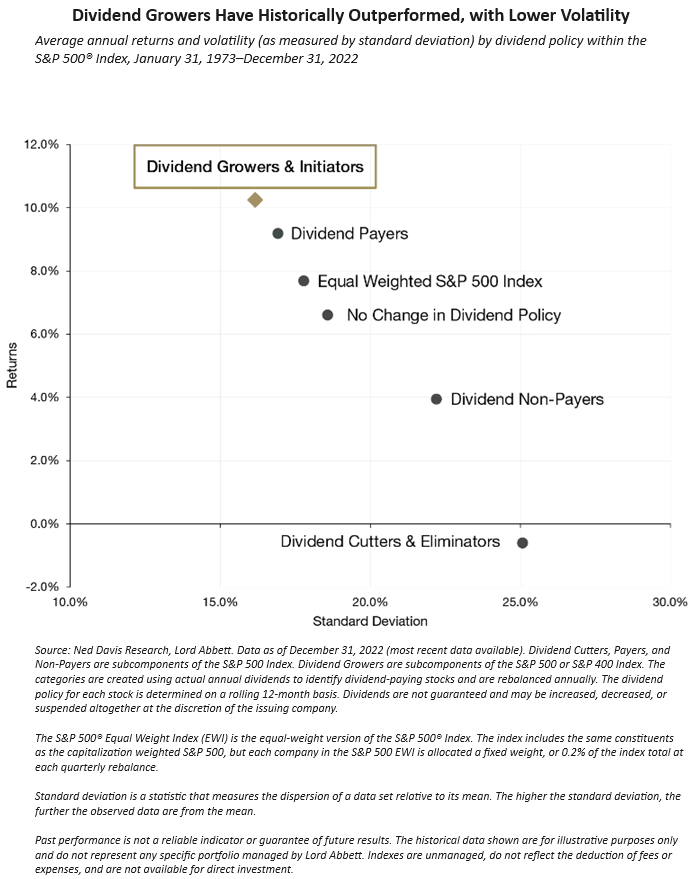Author: David I. Templeton, CFA, Principal and Portfolio Manager
Much of the focus over the last year and half has been on the strong performance of the so-called Magnificent 7 stocks, Meta Platform (META), Apple (AAPL), Microsoft (MSFT), Nvidia (NVDA), Tesla (TSLA), Alphabet (GOOGL) and Amazon (AMZN). There is no denying that these seven stocks have contributed an outsized percentage to the market's overall return. Over the last three months though, a number of the dividend strategies are now outperforming the S&P 500 Index as seen in the below chart. Not included in the chart, but the average total return of the Magnificent 7 stocks is also only 4.3%, lagging the equal weighted S&P 500 Index and matching the total return of the cap weighted S&P 500 Index.
The purple line in the above chart represents the Invesco S&P 500 Equal Weighted ETF (RSP). As the Index name reads, each stock in the S&P 500 is weighted equally in the index. In short, the return of the index represents the average return of a stock in the S&P 500 Index. With the equal weighted index outperforming the cap weighted S&P 500 Index, it means the smaller sized companies are beginning to outperform the larger market cap ones. The broader participation of stocks, along with stronger performance in the dividend strategies, can enable the market to continue its positive upward momentum.
The other aspect with the current environment is more companies are increasing and initiating dividends. According to Howard Silverblatt, Senior Index Analyst at S&P Dow Jones Indices, in the month of April, the year over year increase in dividend declarations (.xlsx) was up 69% (5,367 companies versus 3,169 companies.) Even within the Magnificent 7 stocks, both Alphabet and Meta Platform recently announced both companies will begin paying a dividend. As the below chart shows, within the S&P 500 group of stocks, 404 companies now pay a dividend.
One variable possibly having a favorable influence on company dividend policies is the higher level of interest rates. With the 10-year U.S. Treasury yield approximately 4.5%, this represents competition for stocks if income is a focus for investors. The dividend yield on the S&P 500 Index is only 1.47%. In a recent article by Lord Abbett, Ned Davis Research data notes, since 1929 dividends have accounted for 40% of the total return for the S&P 500 Index. In other words, dividends do matter over time.
In summary, a broader number of stocks are participating in the positive performance of the equity market. Over the course of the last three months the S&P 500 Index utilities sector is up 19.3% followed by energy up 13.7% then materials up 10.8%. The technology sector is only up 1.4% and lags the S&P 500 Index return of 4.3%. Additionally, with the dividend payers now generating better performance, as the below chart shows, the dividend growers and initiators outperform over the long run with less volatility, i.e., lower standard deviation. It isn't that dividend paying stocks won't go down when the market declines, but historically they have declined less, and this group of stocks has lagged the market over the last couple of years and investors may find opportunities with some of the dividend payers.
HORAN Wealth, LLC is an SEC registered investment advisor. The information herein has been obtained from sources believed to be reliable, but we cannot assure its accuracy or completeness. Neither the information nor any opinion expressed constitutes a solicitation for the purchase or sale of any security. Any reference to past performance is not to be implied or construed as a guarantee of future results. Market conditions can vary widely over time and there is always the potential of losing money when investing in securities. HORAN Wealth and its affiliates do not provide tax, legal or accounting advice. This material has been prepared for informational purposes only, and is not intended to provide, and should not be relied on for tax, legal or accounting advice. You should consult your own tax, legal and accounting advisors before engaging in any transaction. For further information about HORAN Wealth, LLC, please see our Client Relationship Summary at adviserinfo.sec.gov/firm/summary/333974.




